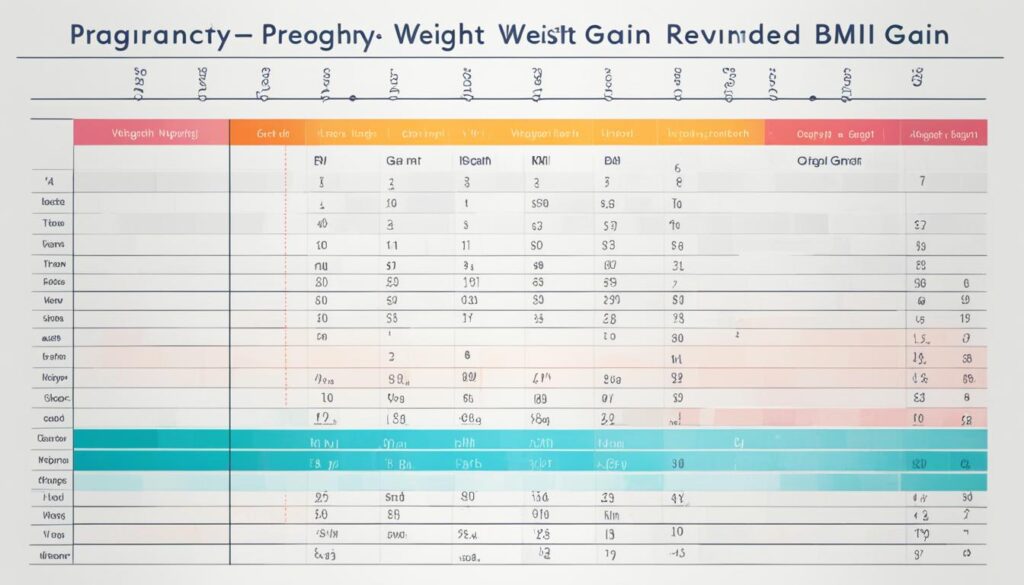People often wonder if losing weight while pregnant is okay. It’s not a clear yes or no. Most women should gain weight, but some can stay the same or drop a few pounds. This depends on your health and where you started.
Losing weight safely in pregnancy is a hot topic. Women with high BMIs might need to gain less. Or, they could work to keep their weight steady. The goal is to talk with your doctor. Together, you’ll make a plan that fits you.
So, can you shed pounds while pregnant? Yes, some women can, but it’s unusual. The real target is to eat well for you and your baby. We’ll look closely at weight changes in pregnancy. This will help you choose what’s best for your health and your baby’s too.
Understanding Weight Gain During Pregnancy
Weight gain is a natural part of pregnancy. As a mom-to-be, I take prenatal weight control seriously for my baby’s health. Let’s see how weight gain steps up and shifts with each pregnancy stage.
Recommended Weight Gain Guidelines
How much weight to gain ties to my Body Mass Index (BMI) before pregnancy. Let’s break it down:
- Underweight (BMI below 18.5): 28-40 pounds
- Normal weight (BMI 18.5-24.9): 25-35 pounds
- Overweight (BMI 25-29.9): 15-25 pounds
- Obese (BMI 30 or more): 11-20 pounds
Impact of Pre-Pregnancy BMI
My starting weight hugely shapes how much to gain. If I start underweight, I may need to gain more. If I begin overweight, I should limit my increase. It’s about what fits for me and my baby.

Trimester-Specific Weight Changes
Gaining weight shifts as pregnancy goes on. In the first three months, I might just put on 1-4 pounds. Then, about a pound each week is typical. My eating changes follow. In the middle three months, I need roughly 340 extra calories daily. The last three months, around 450 more.
These are just pointers. My pregnancy journey is special, and my doctor will shape a plan just for me.
Risks of Excessive Weight Gain in Pregnancy
People wonder about losing weight safely while pregnant. It’s super important because too much weight can cause big health problems for both mom and baby.
- Gestational diabetes
- High blood pressure
- Preeclampsia
- Sleep apnea
- C-section complications
Babies face risks like a higher birth weight, more body fat, and possible delays in growing up. Shockingly, one in every five U.S. women start pregnancy with a BMI of 30 or more. This ups the importance of eating well during pregnancy.
About 33% of women hit the recommended weight gain during pregnancy. If your BMI is 30 or more, for a single baby, you should aim to gain 11 to 20 pounds. Working closely with your healthcare provider is vital.
Don’t forget, getting regular prenatal check-ups, eating healthy, and safe exercise are crucial for a good pregnancy. Strive to do two and a half hours of light exercise each week to help maintain your weight and cut down on health dangers.
Can Lose Weight During Pregnancy: Myth vs. Reality
Is losing weight during pregnancy a good idea? I looked into this to see what’s true. We’ll see if losing weight could be safe and healthy.
Safety Concerns for Mother and Baby
It’s risky to try losing weight quickly when you’re pregnant. Doing so can hurt you and your baby. Make sure you eat well to help your baby grow. Avoid any extreme dieting now.

Medical Perspectives on Pregnancy Weight Loss
Most doctors say no to losing weight on purpose while pregnant. However, for women with obesity, some think losing a bit carefully can be okay. A British Medical Journal study showed that diet and exercise help both moms and babies.
Potential Benefits of Controlled Weight Management
Being careful with what you eat could bring some good things:
- It lowers the chances of gestational diabetes
- It makes preeclampsia less likely
- Helps make delivery easier
- Speeds up recovery after birth
It’s all about balance. Focus on eating healthy and moving enough with your doctor’s advice. This way, you can keep both you and your baby healthy without missing out on needed nutrients.
Healthy Nutrition Strategies for Pregnancy
Eating right when pregnant can be hard. But it’s vital for mom and baby. I’ll share some easy prenatal calorie tips!
- First trimester: No extra calories needed
- Second trimester: About 340 extra calories per day
- Third trimester: Around 450 extra calories daily
I make sure to eat a balanced diet. It includes fruits, veggies, grains, proteins, and fats. I skip junk food and sugary drinks. Instead, I eat foods filled with nutrients for my baby’s growth.
I don’t cut back on food for calorie management. I make smart picks. Snacking on nuts or yogurt and eating smaller meals often works. It keeps me energetic without too many calories.
Taking a prenatal vitamin is a must. I’m careful to get enough folic acid, iron, and more. I take 400-800 mcg of folic acid every day. It helps stop birth defects.
Drinking a lot of water is important too. I drink water all day and limit caffeine. I don’t drink alcohol at all.
Every pregnancy is different. It’s good to discuss diet plans with your doctor. With some care, you can eat well and manage your weight safely now.
Safe Exercise Routines for Expectant Mothers
I’m here to help you find safe ways to stay fit while pregnant. Experts say try to get 30 minutes of moderate exercise a day. This could be a walk or a swim. It’s good for keeping your weight healthy and getting ready for the big day.
Low-Impact Cardiovascular Activities
Low-impact activities are best for cardio. Walking, swimming, and cycling are perfect. They boost your mood and energy without being hard on your body. You should aim for 150 minutes of these activities each week, in short sessions.
Strength Training Considerations
Strength training is important for moms-to-be. You can start with wall pushups. Try to do 15 of them. Squats and leg raises are good for your legs. For your stomach, supported v-sits are great. Begin with 5 and work up to 10. Always do what feels right and never overdo it.
Exercises to Avoid During Pregnancy
Avoid certain exercises when pregnant. HIIT, sports that involve contact, and some back exercises after the first trimester are off-limits. Instead, focus on things like yoga or Pilates. They help keep your muscles strong for birth and recovery.
